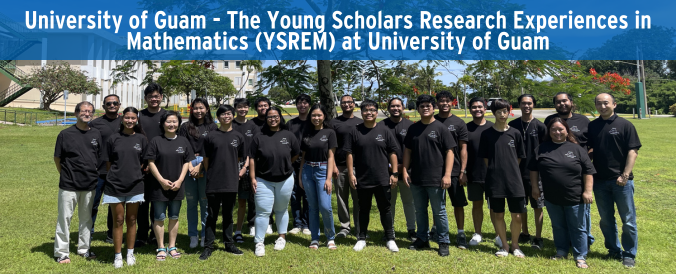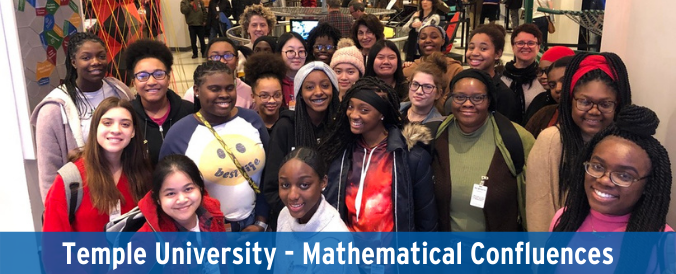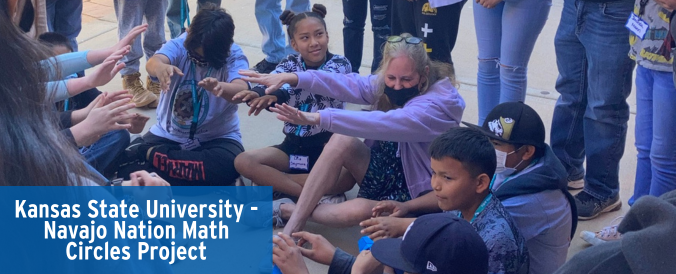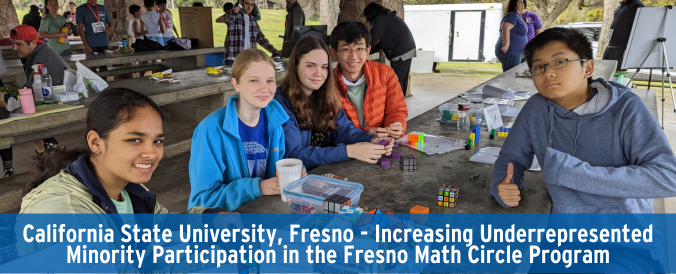- About MAA
- Membership
- MAA Publications
- Periodicals
- Blogs
- MAA Book Series
- MAA Press (an imprint of the AMS)
- MAA Notes
- MAA Reviews
- Mathematical Communication
- Information for Libraries
- Author Resources
- Advertise with MAA
- Meetings
- Competitions
- Programs
- Communities
- MAA Sections
- SIGMAA
- MAA Connect
- Students
- MAA Awards
- Awards Booklets
- Writing Awards
- Teaching Awards
- Service Awards
- Research Awards
- Lecture Awards
- Putnam Competition Individual and Team Winners
- D. E. Shaw Group AMC 8 Awards & Certificates
- Maryam Mirzakhani AMC 10 A Awards & Certificates
- Two Sigma AMC 10 B Awards & Certificates
- Jane Street AMC 12 A Awards & Certificates
- Akamai AMC 12 B Awards & Certificates
- High School Teachers
- News
You are here
Tensor SUMMA Grants
The Tensor Foundation has provided funding for the MAA to award Tensor SUMMA (Strengthening Underrepresented Minority Mathematics Achievement) grants for projects designed to encourage the pursuit and enjoyment of mathematics by students who are members of groups historically underrepresented in the field of mathematics. These include students who are Black or African American; American Indian or Alaska Native; Hispanic or Latino; or, Native Hawaiian or other Pacific Islander. If your project will be targeted toward another group that you believe would qualify for the project, you may wish to consult with us before submitting your proposal. Projects may be designed for middle school students, high school students, or college/university students.
About the Program How to Apply Previous Awardees Contact Us
About the Program
Projects should provide enrichment activities that lead to heightened interest in mathematics and deeper appreciation of it. These projects are not intended for remedial help for students who need assistance in order to succeed in their coursework in mathematics. They should encourage students to continue studies of mathematics in high school and college and should better prepare them for those studies. Undergraduate and graduate students may serve as role models and work directly with students under the tutelage of faculty from both the college or university and middle or high school.
Active engagement in doing mathematics is an essential feature. Participants should be made aware of career opportunities in mathematics and mathematically intensive disciplines. Implementation of a mentoring component is encouraged and desirable. Please assure that any mentoring component for youth that is included is consistent with local laws and regulations for the implementation of such projects.
Projects should be conducted over a sufficient period of time to engage student participants in learning and applying new and interesting mathematics that they would not encounter in their classes. Projects may be conducted during the summer or during the school year, on weekends, or after school.
Proposed projects may replicate existing successful projects, adapt components of such projects, or create new, innovative projects. Project design should reflect strategies that have been shown to be effective in increasing underrepresented minority achievement.
Funds may be used to supplement existing projects in order to increase the number of minority students participating in those projects or may be used to initiate new projects. Participation may not be barred to members of any group, but it must be clear that the project will seek to recruit and serve participants from historically underrepresented groups.
Nature of the Grant
Grants will be awarded up to $6,000 and will be made to the institution of the project director for a one-year project. An institution is expected to supply matching funds or in-kind support as an indication of its commitment to the project. These grants will not support any institutional indirect costs or provide fringe benefits. Unexpended funds may be carried forward but require significant justification before approval. Grants may be awarded for a maximum of three years total from the Tensor programs, but grant recipients must reapply each year, should they wish to continue their projects.
Sample Activities
Projects may adapt components of existing successful projects or be innovative. Possible projects, all of which have a strong mathematical component, are to:
- Student group and individual research experiences
- Math Circles
- Summer mathematics camp
- Math clubs
- Preparation for competitions such as the Putnam Competition for college students, MAA American Mathematics Competitions for middle and high school students, and other regional and national competitions.
Note: Projects do not need to incorporate all of the above suggestions.
How to Apply
To apply for an MAA Tensor SUMMA Grant you must submit an application through Amplifund, our online application portal. You will need to create a free account within the Amplifund system. If awarded, this account will be used to administer your award, so please be sure to enter all of your contact information correctly.The application portal for 2024 is now closed.
Before starting the application, you will have the opportunity to download the full application to gain insight into all the information that will be required for a successful application. We encourage applicants to do this before applying.
Available Now
Watch this recorded webinar to get all of your questions answered about applying for a Tensor grant from the MAA! We'll take you through some of the most commonly asked questions regarding applications to the Tensor Women and Tensor SUMMA programs, as well as review the applications portal.
How to Create an Amplifund Account
On the "Application Details" page, click "Apply". On the next screen, click "Register". Enter the information as requested, and read and accept the terms and conditions. You may now complete your application.
Getting Started with Amplifund
Get started with Amplifund by watching this video. You will learn about setting up an account, completing an application, and submitting an application.
Who May Apply
Applications will be accepted from college and university mathematical sciences faculty. Mathematical sciences faculty should be integrally involved in the proposed project. They must be working with high school or middle school mathematics faculty if the project targets those students.
Characteristics of Effective Projects
While projects will have a high degree of variability, there are effective projects targeting underrepresented minorities which share some characteristics:
- Clearly articulated and measurable project objectives;
- Strong academic component, with a focus on enrichment;
- Highly competent, committed, and stable project team;
- Plans for successfully recruiting and retaining underrepresented minority participants;
- Provision of information on careers that use mathematics extensively in a way that will encourage students to pursue the study of mathematics;
- Use of appropriate role models;
- Development of a peer support system;
- An environment of mentoring;
- Institutional commitment;
- Programs that last longer than one-day events.
- A plan for recruitment of participants from underrepresented minority backgrounds.
- A plan for evaluating the success of the program against the objectives - including data (qualitative and/or quantitative)
Application Requirements
Please submit all proposal materials by the deadline. Proposals received after the deadline will not be considered. Proposals from the same institution of higher education may be submitted to both the Tensor SUMMA and Tensor Women & Mathematics programs, but must support different programs and must have different personnel. You will receive notification of the outcome of your proposal by the end of March.
Proposals will be reviewed by a panel which can include members of the MAA Committee on Minority Participation in Mathematics, other MAA members, professionals involved in outreach, and a trustee of the Tensor Foundation acting as an advisor.
Please be prepared to include the name and mailing address of a Financial Officer in charge of this grant. The Financial Officer should be a person in your institution who will accept the award direct deposit for this grant, ensure that the funds are available to the project team, and help the Project Director with preparing the final expenditure report on the project. At most institutions, this is someone in the Sponsored Programs Office. We encourage you to discuss this project with your sponsored programs office or grants office before applying.
Make sure you have the following documents ready as separate PDF files as you will be asked to upload them in the appropriate sections of your application:
- Project Description as specified in the next section;
- CVs of Project Director and any Co-Directors (2 page limit per CV);
- Letter(s) of Recommendation from your department chair, institutional administrators, project partners, or any other key stakeholders who are engaged with the project. If you are working with a high school, at least one letter should be from the appropriate leadership personnel at that school. The letter should indicate their recommendation of your leadership for the project and their support for the project in general. You must have at least 1 letter of recommendation from an appropriate person at your institution.
- Your institution is expected to show an indication of commitment to the project. The commitment can be any percentage of matching funds, or in-kind support, such as free use of facilities to host your project. Please prepare a brief narrative that describes how your institution is showing commitment to your project. Additionally, please include a total budget that outlines how you will spend all funds allocated to this project, including the requested funds for this proposal, institutional commitment funding, and, if applicable, remaining funds from a previous grant.
Renewals
If the project is a renewal, please be prepared to state the year or years that funding was previously granted and upload a two-page (maximum) summary of progress to date, a brief overview of any evaluation results, and a budget summary of money expended to date and, if applicable, plans for spending remaining funds. You must justify how you will spend the remaining funds and all new funds in order to be awarded the full amount requested. If your summary of progress and financials is not sufficient, your proposal will not be renewed.
Project Description
The following should guide your proposal narrative listed using a 11 or 12 point font and not exceeding 5 pages
- Concept: state the ideas that form a basis for your project design. Include a description of the context/local conditions that make your project appropriate. Why will your strategies work?
- Goal Statement: What is your overarching goal for the project?
- Objectives to meet the goal
- Recruitment: your plan for reaching the target audience
- Activities: detailed description of the activities of the project, including the mathematics that participants will learn
- Personnel qualifications: provide the name, position, and qualifications of the project director and principal members of the team and their role in the project
- Timeline: timeline for the activities before, during and, if relevant, after the funding year
- Commitment: In what way is your institution a welcoming host and what resources can the institution provide? What is the long-term commitment of the host institution to the goals of the project and its specific activities?
- Evaluation: How will you evaluate the success of the project relative to the objectives? What data, qualitative or quantitative, will you provide, including information on project expenditures, as part of a brief final report to be submitted at the end of the funding year?
- Sustainability: What is the likelihood of institutionalizing through local or state or institutional funding after the start-up funding provided by the Tensor Foundation?
Project Budget
During the course of the online application, you will be asked to submit a proposed budget for your project. There will be a fillable budget template for you to complete.The budget form will have separate lines for you to enter amounts for personnel, materials, student support, travel, etc. Each line will also have a space for your budget justification. Please include a brief but thorough narrative justifying the need for each budget item. Ex. "Supplies - We are requesting "X" amount of money to purchase supplies such as pens, pencils, markers, and notebooks for the students to use for their daily projects." If your budget justification is blank or does not include enough information to justify the expense, your proposal will not be reviewed. Please note that this budget is only for new funds requested; not for any remaining funds from a previous project, which should be noted in a separate document as mentioned above in the "Renewals" section. The form will automatically total your line items and will not allow your budget to exceed the amount you requested. Proposals that focus spending on project participants are found more favorable.
As mentioned above, your institution is expected to show an indication of commitment to the project. The commitment can be any percentage of matching funds, or in-kind support, such as free use of facilities to host your project. In the application, you will be asked to upload a brief narrative that describes how your institution is showing commitment to your project. Additionally, please include a total budget that outlines how you will spend all funds allocated to this project, including the requested funds for this proposal, institutional commitment funding, and, if applicable, remaining funds from a previous grant.
Please note: Tensor Foundation grants do not support fringe benefits.
Frequently Asked Questions
Yes, you will need to create a free Amplifund account in order to apply.
The exception to this would be if your institution already has an Amplifund account. Amplifund is the grants management system for many organizations, not just MAA, so it is possible that your institution’s grants office, or sponsored programs office, has an account for your institution already. If that is the case, please contact that office directly.
On the Opportunity Details page, you will see a button that says “Apply” in the upper right of the screen. Click on “Apply” and then click “Register” on the next screen. You will be asked to enter some information about yourself and your organization (note: for academic institutions please select “Other” as organization type), and then you will be asked to accept the terms and conditions. Once this is complete, you may begin your application.
When setting up your Amplifund account you will be asked for your organization name and type. This organization will be the fiscal agent for the grant you are applying for (usually a college/university). For organization type, most academic institutions should select “Other” unless they are applying as a Foundation or Corporation. If you’re unsure, please contact your grants or sponsored programs office.
No, each institution/college/university should only create one account that everyone should use to apply. We suggest that you contact your grants or sponsored programs office directly to coordinate this.
This should be the title of your project, i.e. “[University Name’s] Math Circle” or “Girls Doing Math Camp”, etc.
Yes! At any point while you’re filling out the application form you can download the application in its entirety. Additionally, before submitting, on the final screen there will be a button that says “Review” with a download arrow. Click on this button to download your completed application before submitting.
Amplifund has a built-in safety feature to prevent applicants from missing sections. Each page/section of the application needs to be “Marked as Complete” in order for the system to register that it is in fact complete. There is a button at the bottom of each page/section called “Mark as Complete”. Make sure you have clicked this on each page (when clicked, the button becomes “Mark as In Progress”).
You will receive a confirmation email at the email address you used to create your Amplifund account.
Funding for the Tensor programs is limited, and the MAA will make every attempt to support a broad range of projects from various geographic locations. If any department is interested in submitting more than one proposal, the proposals must support different programs and must have different personnel.
A proposal submitted to multiple programs in the same year will only be considered for one. The Program Directors will decide which program it is best suited for, and reject it from the other programs
No, they don’t need to be MAA members. While project personnel credentials are a factor in making a funding decision, their MAA membership status does not affect their chances of getting a grant.
CV is limited to two pages per EACH of the project co-directors.
Your budget may not pay for release time for faculty. It is assumed that this will be covered by your university as in-kind contribution.
Tensor SUMMA and Tensor Women do not have such a restriction, but one-day events without follow-up have not been seen as competitive projects.
We do expect some institutional support or commitment from your college or university, but this can be in-kind contribution, such as in the form of materials, office supplies, use of space, etc. They need not match dollar-for-dollar. The institutional support requirement is meant to indicate your institution’s commitment to your project.
Indirect cost (also called Facilities and Administrative Rate, or F&A Rate) is the mechanism used to reimburse a university for the infrastructure support costs associated with sponsored research and other sponsored projects. The F&A rate is essentially an overhead rate. Tensor programs do not support indirect costs.
At this time, applications will be accepted from college and university mathematical sciences faculty at accredited U.S. (including U.S. Territory) or Canadian institutions.
Contact Information
For further information regarding proposed projects, please contact the MAA Tensor SUMMA Program Director Candice Price by email cprice@smith.edu.
For consultation on your ideas for projects, proposers are encouraged to contact the MAA Tensor Proposal Advisor Alicia Prieto Langarica.
For technical information regarding submission of your proposal, contact the MAA Programs Staff, by email programs@maa.org.








